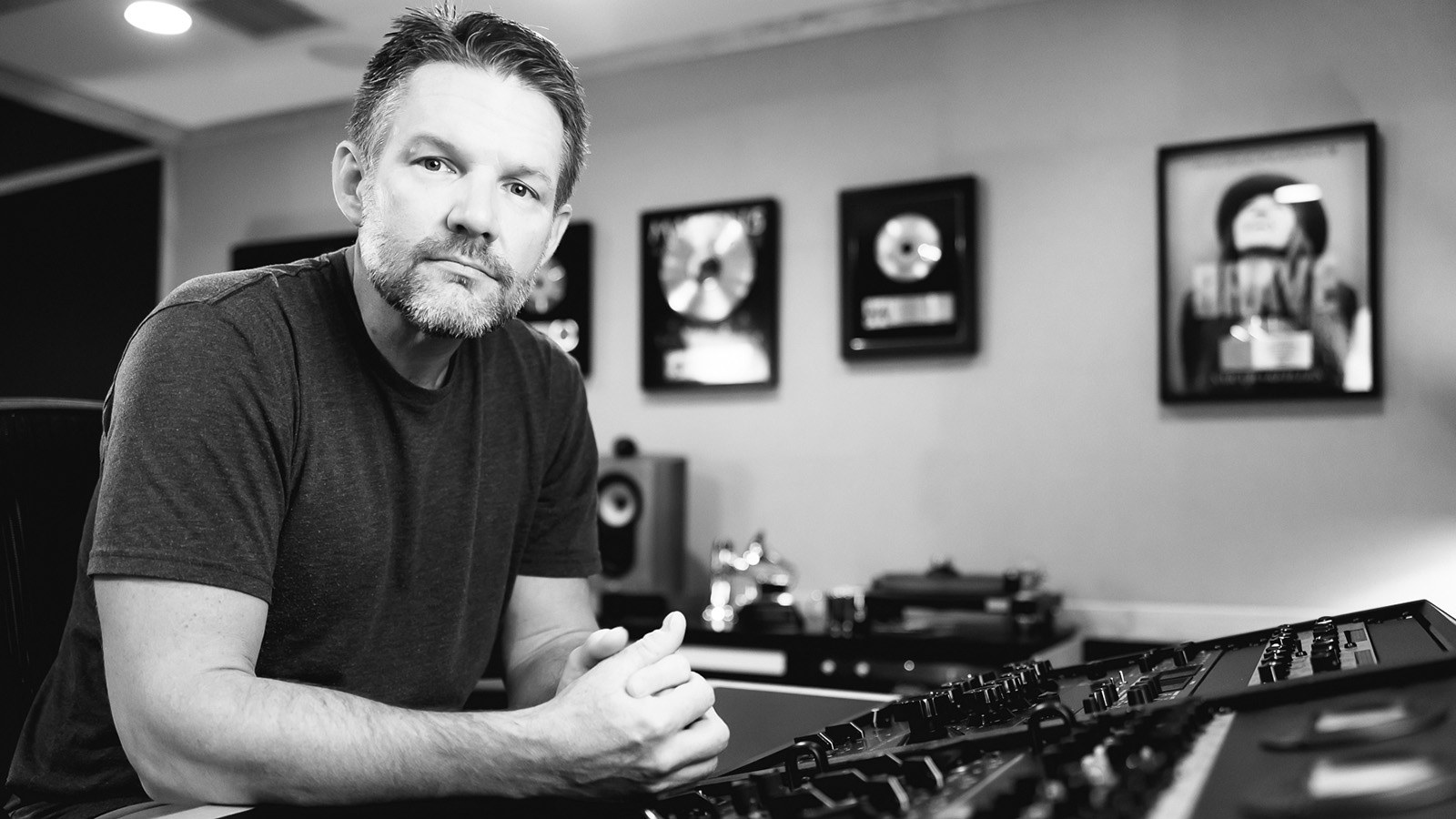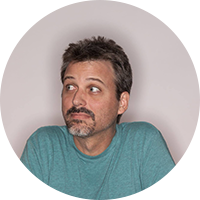Full Sail Stories
Published Oct 27, 2023
Grad Brad Blackwood Talks Mastering, Spatial Audio, and the Emotional Impact of Music
As the founder of Euphonic Masters in Memphis, Brad has worked on everything from Grammy-winning Alison Krauss albums to the new Dolby Atmos mix of Prince's 'Diamonds and Pearls'.

"I didn't even mean to become a mastering engineer," laughs Full Sail grad Brad Blackwood.
This statement may come as something of a surprise to those who know him, since Brad is the owner of Euphonic Masters, a Memphis-based studio that's mastered new releases by acts ranging from Allison Krauss to Mammoth WVH as well as Dolby Atmos remixes of classic albums like Fleetwood Mac's Rumours and Prince's Diamonds and Pearls. And while he never intended to be the guy who puts the final touches on an album release, his lifelong fascination with music and how music's fidelity can increase its emotional impact meant that the mastering suite was almost certainly where he was destined to wind up.
"I'm not one of these people that grew up playing instruments or grew up with parents who played instruments," says Brad, who grew up in Lake Mary, Florida, near Orlando. "I hear so many people who, when they tell their stories, they have so much of this rich musical background. My rich musical background consists of me just loving music. And when the Black Crowes' second record [The Southern Harmony and Musical Companion] came out, I remember listening to that and thinking, 'This is what I want to do with my life. I want to be a part of the process that makes stuff that affects people the way this affects me,' because that record really impacted me tremendously."
Unsurprisingly, for a kid in the Orlando area with a desire to be part of the team that makes albums, Full Sail was on Brad's radar early on.
"It was the coolest thing I'd ever seen," says Brad of his reaction to seeing Full Sail's facilities after taking a campus tour. "I'd never been in a real studio before, so seeing the John Storyk design [of Full Sail Studio A], with this massive console... I mean, it was just amazing. I was like 'This is what I've got to do [after high school].'"
After a short detour to a traditional school in Alabama ("I was honestly just kind of miserable there," he laughs), he returned to Florida to study recording arts at Full Sail. Brad graduated third in his class and, after a brief stint working at a local theme park doing A/V work, he worked with Full Sail's Career Development department to land an interview at Ardent Studios, the legendary Memphis facility where classic albums from Big Star, ZZ Top, and many others were recorded.
"I wanted to work in a rock studio that did live recordings," says Brad of his decision to pursue a role at Ardent. "I wanted guitars and amps and microphones. I wanted to work at a multi-room facility that was a real, established place... a place that's got history. When I saw that Led Zeppelin III was mixed there, it was the perfect fit for me, and I loved it there."
As with most entry-level roles at recording studios, Brad's early work was not exactly the equivalent of mixing Led Zeppelin III.
"I was the night guy," he explains. "At 5 o’clock, they lock the front door, and [I] would sit in a little office by the back door listening for somebody to ring the bell, acting like security, just letting people in and out, answering phone calls, making coffee, cleaning up studios, that kind of thing."
Soon after he started there, though, Ardent purchased one of the first Studio Audio Disk Editor (SADiE) digital audio workstations that was available. For a studio with such a long and illustrious history of analog recording, the arrival of a new digital editing system was greeted with a healthy dose of skepticism by most of Ardent's crew – except for Brad.
"When they got the SADiE, I told my wife 'I'm gonna take that box over. I'm going to become the editing guru.' And that's what I did," he laughs. "Basically, just any time they needed any editing done, they would just call me and say 'Hey, can you come in and do this two-track stuff?' So I got to work with some really cool bands and got some cool credits early on, just because I was doing digital editing when very few people were.
"Eventually, 'Hey, can you edit this?' turned into 'Hey, can you do some EQ?' or "Hey, can you burn a reference CD?' and over time, it just sort of evolved into me turning out stuff that was basically fully mastered records. So it happened really organically, and once I was doing it, I was like, 'This is the greatest thing ever.'"
After seven years at Ardent, Brad headed out on his own and started Euphonic Masters in 2003.
"It was an act of faith," he says of the decision to launch his own company. "I was fairly convinced that the only reason I had some regular clients was because of the Ardent Studios name, but I was desperate for the freedom that running my own shop offered, so I took the chance. I had no idea if anyone would follow me, but as far as I know, every single client [I worked with at Ardent] did."
Over the years, Euphonic has handled a wide range of clients, from bluegrass and alternative rock to heavy metal and classic funk. This genre agnosticism has helped Brad grow Euphonic into one of the leading mastering studios in the U.S. He's also won quite a few awards along the way, like the first Master of Mastering Pensado Award and multiple Grammy nominations, including a Best Engineered Album, Non-Classical win for his work on Alison Krauss & Union Station’s Paper Airplane.
"I just love music, all kinds of music," he says. "There’s something about helping an artist who has spent countless hours perfecting a specific playing or singing style in order to share their art with others that really resonates with me, and I get excited about it whether it’s acoustic bluegrass or heavy metal."
But, he says, "Awards are yesterday's news. The reality is, I'm focused on the next project, and the next chance to work on something that moves someone emotionally." For Brad, that next "something" is the possibilities that come with the latest advances in spatial audio, particularly Dolby Atmos. Having mastered the Atmos versions of classic titles from artists like Fleetwood Mac, Brad was excited to get to work on the spatial audio version of Prince's Diamonds and Pearls album for its 2023 deluxe reissue.
"Usually when somebody remixes something, I'm like, 'Yeah, it's not going to be as good.' But Chris James, the guy who mixed [the Atmos version of Diamonds and Pearls] just obsessed over this, and it is amazing. It is better than the original album. And the mastering is probably more critical now than ever before with the introduction of Atmos, because now instead of just trying to worry about two speakers, you've got usually a dozen speakers or more that are involved."
And while these new technologies can present challenges, to Brad, dealing with those inevitable complications is worth it for the heightened emotional impact.
"It's incredible what you can do if you're willing to spend the time and put the work into it," he says. "I [love mastering] because my background is not as a performer, but as a listener. I've always been a hi-fi geek and I grew up listening to the overall presentation [of an album] rather than the individual parts. And mastering, that's really what it's about. Obviously, details are a very important part – you want to catch things that you can fix, like little clicks or pops or whatever – but overall, it's about how does this impact the listener? Everything we do is about that. How can we affect the listener?"



